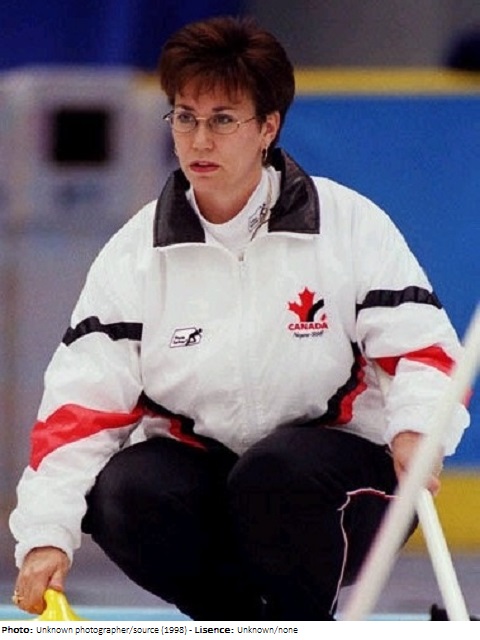Born with a club foot, curler Sandra Schmirler entered the University of Saskatchewan pursuing a degree in computer science and was an unlikely candidate for a future Olympic gold medal-winning athlete. By the time she graduated in 1985, however, she had earned a Bachelor’s Degree in Physical Education and had a provincial junior curling championship to her name that she had earned in her senior year of high school. She moved to Regina, Saskatchewan and began working at the North West Leisure Center. Two years later she had won a provincial senior curling championship and, with Joan McCusker, Jan Betker and Marcia Gudereit, took the Canadian Women’s Curling Championship (known as the Scotties Tournament of Hearts) in 1993. This earned them the right to represent Canada at that year’s World Curling Championships, where they defeated the German rink (team) to win the gold medal. She repeated this feat the following year, becoming the first Canadian rink to win consecutive World Championships. In 1997 the team pulled it off yet again, winning not only their third Canadian and World Championships, but also their third ranking as “Team of the Year” by Saskatchewan sport. Her team was also awarded honorary Doctor of Laws degrees from the University of Regina.
In 1998, Schmirler’s rink edged out Shannon Kleibrink’s to earn the right to represent Canada at that year’s Winter Olympics, where curling was being officially contested for the first time since 1924. After their gold medal victory against a field of tough competitors, the rink earned the title of “Team of the Year” from the Canadian Press and its members were inducted into the Curling Hall of Fame in 1999. The team lost that year’s Canadian Championships in the semi-finals and Schmirler worked with CBC as a color analyst for the final match. After the birth of her second daughter 1999, Schmirler began experiencing severe health problems and doctors discovered a cancerous tumour near her heart. She nearly died during the operation to remove it when a dead piece broke off and released a blood clot in her lungs, stopping her heart. She was soon thereafter diagnosed with metastatic adenocarcinoma. She continued working as a commentator during her treatment, but in early 2000 it was discovered that the cancer had spread to her lungs and she died soon after, in March. Her funeral was broadcast live by TSN and CBC, the first time a Canadian athlete’s funeral had been televised live by more than one network. After her death she became the Saskatchewan Order of Merit’s first posthumous recipient and was inducted into the Canadian Sports Hall of Fame. The city of Regina renamed the South East Leisure Center in her honor, as well as the road leading up to her curling club. Biggar, Saskatchewan, the city of birth, constructed the Sandra Schmirler Olympic Gold Park and completed it in August of 2000 and, since February of 2001, the Sandra Schmirler Foundation has helped raised funds for infants with medical crises. In 2009, nearly a decade after her death, she was honored with that year’s World Curling Freytag, which recognizes exceptional achievement in the sport.

 Canada
Canada CAN
CAN